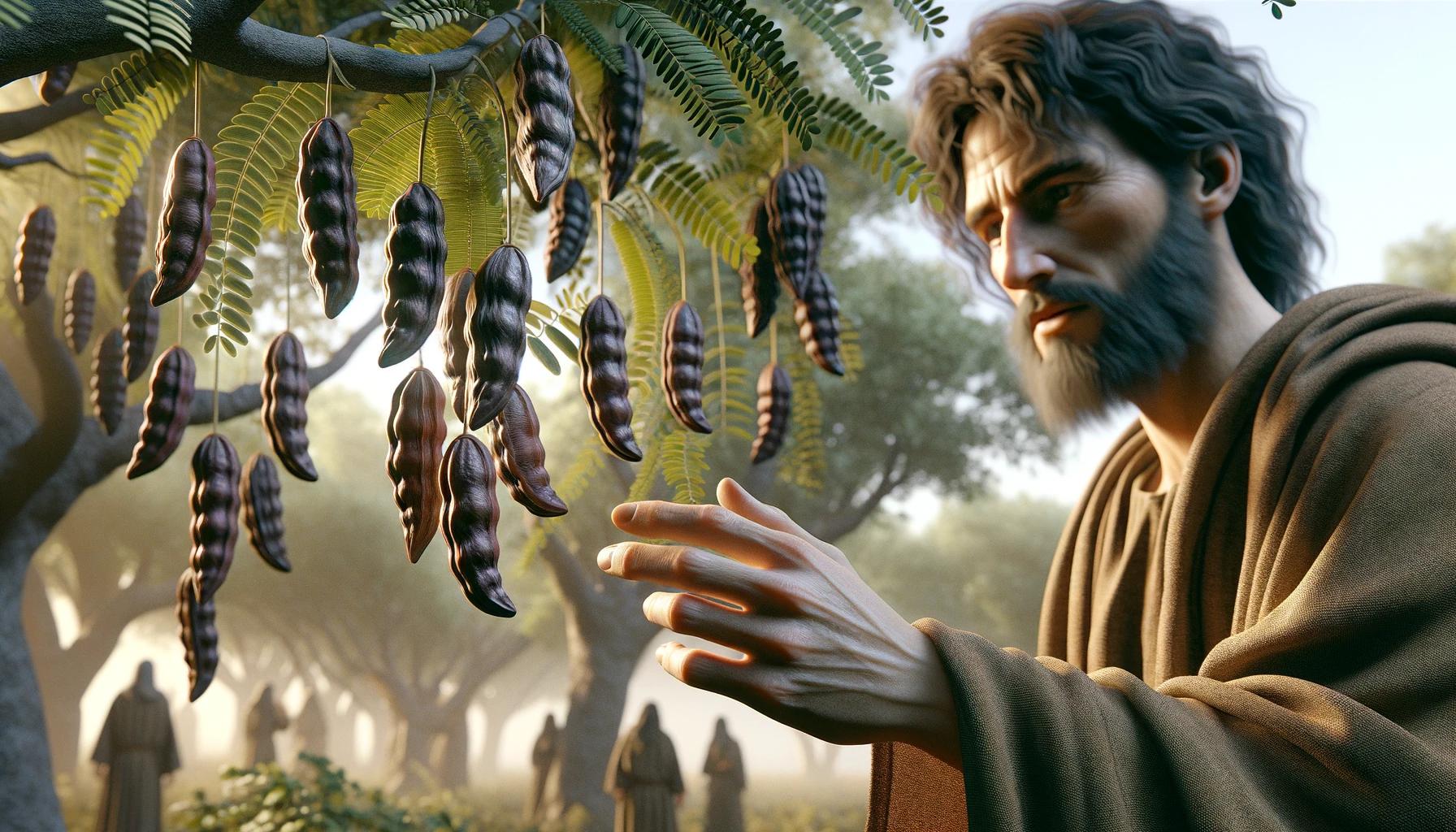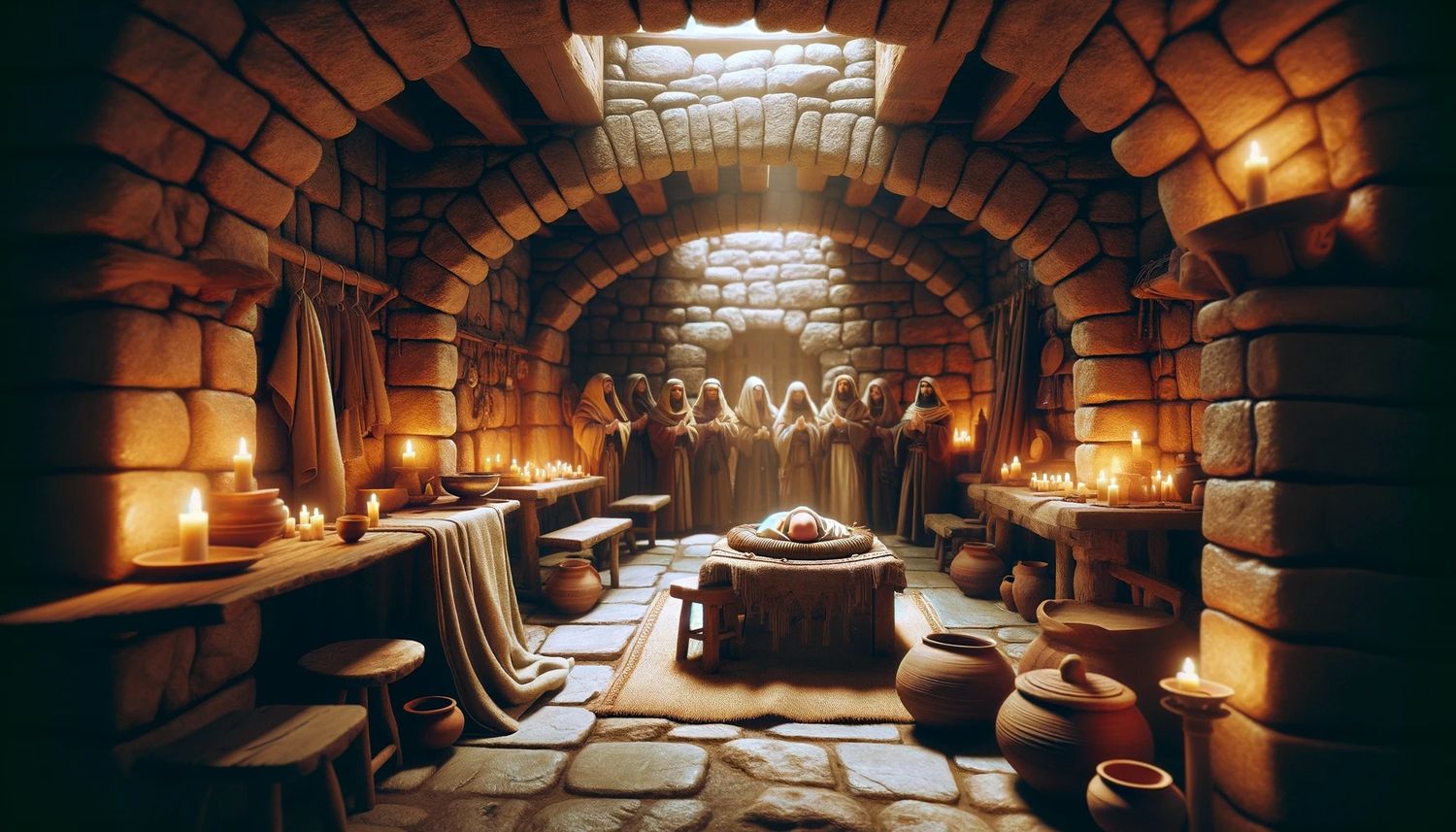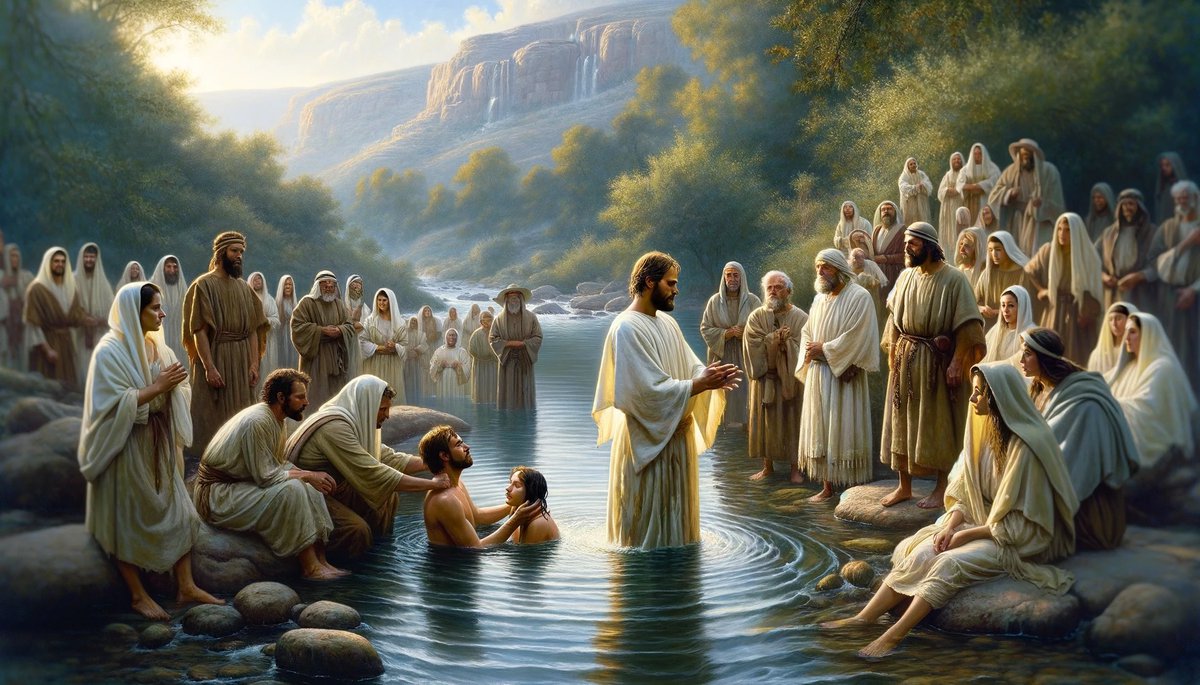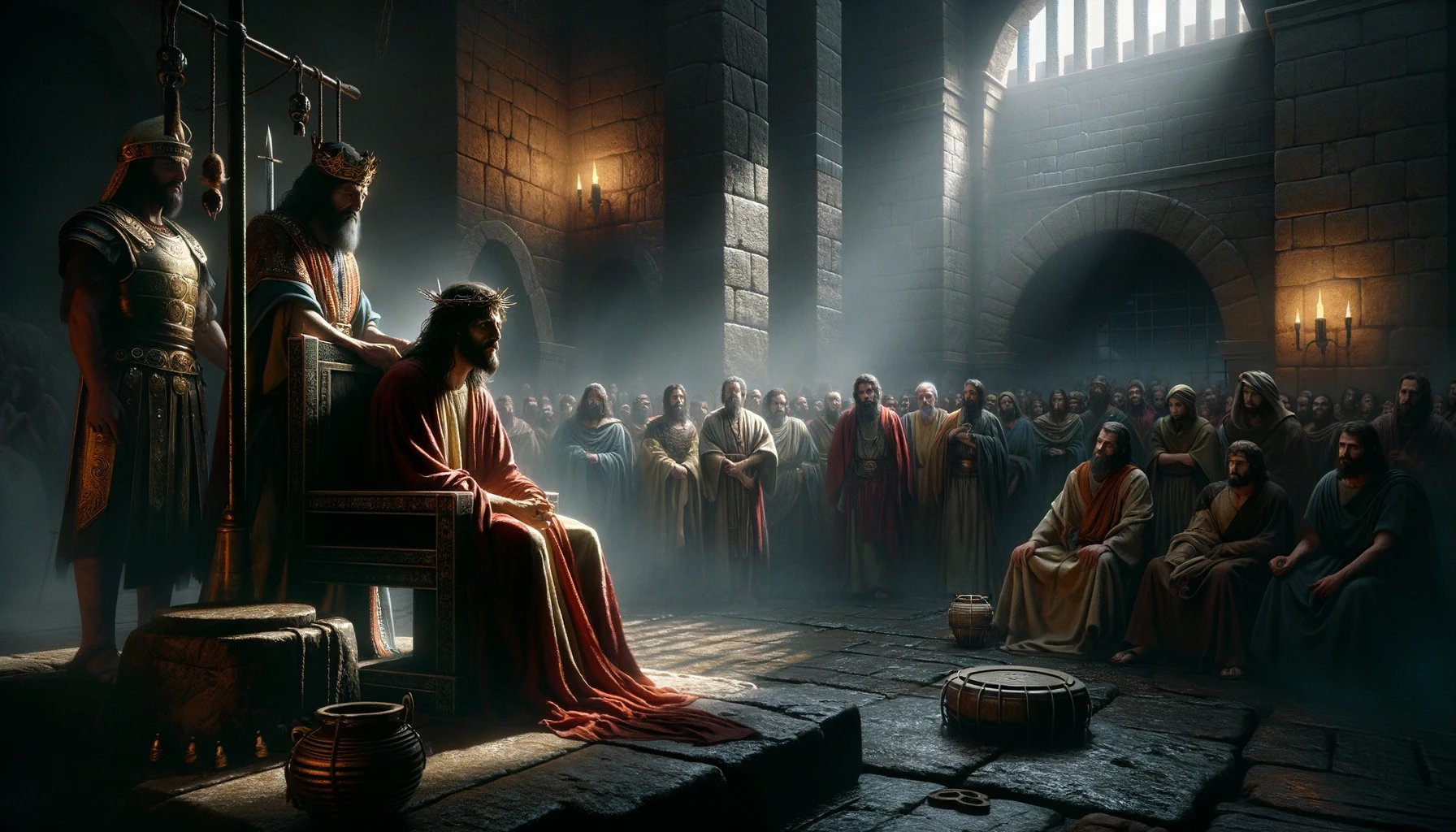Home>Theology and Spirituality>Why Did John The Baptist Eat Locust And Wild Honey


Theology and Spirituality
Why Did John The Baptist Eat Locust And Wild Honey
Published: February 23, 2024
Peter Smith, Editorial Director at Christian.net, combines deep insights into faith, politics, and culture to lead content creation that resonates widely. Awarded for his contributions to religious discourse, he previously headed a major organization for religious communicators, enhancing dialogue on faith's societal impacts.
Discover the significance of John the Baptist's diet of locust and wild honey in theology and spirituality. Explore the spiritual symbolism and historical context.
(Many of the links in this article redirect to a specific reviewed product. Your purchase of these products through affiliate links helps to generate commission for Christian.net, at no extra cost. Learn more)
Table of Contents
- Introduction
- The significance of John the Baptist in religious history
- Locusts and wild honey in the context of John the Baptist's lifestyle
- The symbolic meaning of John the Baptist's diet
- The practical reasons for John the Baptist's choice of food
- The cultural and historical context of locusts and wild honey in the region
- Conclusion
Introduction
John the Baptist, a prominent figure in religious history, is often depicted as an enigmatic and intriguing personality. His unconventional lifestyle and dietary choices have sparked curiosity and debate for centuries. One of the most perplexing aspects of his life is his consumption of locusts and wild honey. This seemingly unusual diet has captured the imagination of scholars, theologians, and the general public, prompting a deeper exploration of its significance.
In this article, we will delve into the multifaceted layers of John the Baptist's dietary habits, seeking to unravel the symbolic, practical, and historical dimensions of his choice to consume locusts and wild honey. By examining the cultural context, religious symbolism, and practical considerations surrounding his diet, we aim to gain a comprehensive understanding of this intriguing aspect of John the Baptist's life. Through this exploration, we hope to shed light on the profound significance of his dietary choices and their relevance to his spiritual mission.
The significance of John the Baptist in religious history
John the Baptist holds a pivotal role in religious history, particularly within the context of Christianity. As a precursor to Jesus Christ, he is revered as a prophet and a herald of the Messiah in Christian theology. His significance transcends mere historical documentation, as his life and teachings have profound implications for the development of Christian doctrine and the understanding of salvation.
John the Baptist's emergence as a prophetic figure marked a crucial juncture in the timeline of religious narratives. His proclamation of repentance and the imminent arrival of the Messiah served as a catalyst for spiritual awakening and transformation among the people of his era. His baptismal rituals symbolized a profound cleansing and preparation for the arrival of the long-awaited savior, Jesus Christ.
Moreover, John the Baptist's unwavering commitment to his divine calling and his fearless denunciation of moral corruption and hypocrisy set a powerful example for future generations of believers. His uncompromising stance on righteousness and his humility in acknowledging the superiority of the Messiah exemplify the virtues of humility and devotion, which continue to inspire and guide adherents of the Christian faith.
Furthermore, John the Baptist's recognition of Jesus as the Lamb of God and his pivotal role in baptizing Jesus in the River Jordan underscore his indispensable contribution to the narrative of Christ's ministry. This pivotal event not only solidified Jesus' divine mission but also affirmed John the Baptist's prophetic insight and unwavering dedication to fulfilling his role in the grand design of salvation.
In essence, the significance of John the Baptist in religious history lies in his profound influence on the trajectory of Christian belief and practice. His unwavering commitment to his divine calling, his pivotal role in heralding the arrival of the Messiah, and his enduring legacy as a symbol of humility and righteousness continue to reverberate through the annals of religious history, shaping the collective consciousness of believers and serving as a timeless testament to the power of faith and divine purpose.
Locusts and wild honey in the context of John the Baptist's lifestyle
John the Baptist's choice to consume locusts and wild honey is a fascinating aspect of his unconventional lifestyle. This dietary preference, seemingly at odds with societal norms, holds profound significance within the broader framework of his mission and message. The consumption of locusts and wild honey was emblematic of John the Baptist's ascetic lifestyle, reflecting his deliberate detachment from material comforts and his unwavering commitment to a life of spiritual devotion.
The consumption of locusts, a type of grasshopper, and wild honey was emblematic of John the Baptist's ascetic lifestyle, reflecting his deliberate detachment from material comforts and his unwavering commitment to a life of spiritual devotion. In the context of his austere existence in the wilderness, these unconventional food choices underscored his renunciation of worldly pleasures and his singular focus on spiritual contemplation and divine communion.
Furthermore, the simplicity and purity of locusts and wild honey align with the essence of John the Baptist's message of repentance and spiritual purification. By partaking in this modest fare, John the Baptist embodied the virtues of humility, self-discipline, and detachment from earthly indulgences, thereby setting an example for his followers to embrace a life of spiritual simplicity and inner purity.
The consumption of locusts and wild honey also served as a powerful symbol of John the Baptist's prophetic role and his distinct identity as a voice crying out in the wilderness. His unconventional diet distinguished him as a figure apart from the societal norms of his time, emphasizing his prophetic calling and his unwavering commitment to preparing the way for the coming Messiah.
Moreover, the wilderness setting in which John the Baptist resided and subsisted on locusts and wild honey evokes the imagery of ancient prophets and ascetics who sought divine revelation and spiritual enlightenment in the solitude of the desert. This deliberate choice of environment and sustenance underscores John the Baptist's embodiment of the prophetic tradition, aligning him with the lineage of revered spiritual figures who sought communion with the divine in the wilderness.
In essence, the consumption of locusts and wild honey within the context of John the Baptist's lifestyle serves as a poignant symbol of his asceticism, his prophetic identity, and his unwavering commitment to a life of spiritual devotion and preparation for the imminent arrival of the Messiah. This aspect of his life not only exemplifies his radical departure from societal norms but also underscores the depth of his spiritual conviction and his embodiment of the prophetic archetype in the annals of religious history.
The symbolic meaning of John the Baptist's diet
The dietary choices of John the Baptist, particularly his consumption of locusts and wild honey, hold profound symbolic significance within the context of his spiritual mission and prophetic role. These seemingly unconventional food choices were laden with rich symbolism, reflecting the core tenets of John the Baptist's message and his embodiment of the prophetic archetype.
The consumption of locusts and wild honey symbolized John the Baptist's commitment to a life of spiritual purity and simplicity. In the ancient world, locusts were considered a readily available and sustainable food source, often consumed by those living in the wilderness. By partaking in this humble fare, John the Baptist demonstrated his detachment from material comforts and his embrace of a life characterized by austerity and spiritual contemplation. The simplicity of his diet underscored his unwavering dedication to a life of humility and inner purity, serving as a powerful visual metaphor for the spiritual virtues he espoused.
Furthermore, the choice of locusts and wild honey as sustenance aligned with the prophetic tradition of ancient ascetics and wilderness-dwelling figures. Throughout history, the wilderness has been regarded as a space of divine encounter and spiritual revelation, where prophets and mystics sought communion with the transcendent. By subsisting on the sustenance of the wilderness, John the Baptist positioned himself within this venerable tradition, emphasizing his role as a prophetic voice preparing the way for the coming Messiah.
The symbolism of John the Baptist's diet also extends to the broader themes of repentance and spiritual renewal that permeated his message. His call for repentance and the cleansing of one's inner being found resonance in his dietary choices, as the consumption of locusts and wild honey signified a symbolic cleansing and purification. This embodied the essence of his message, urging individuals to forsake worldly indulgences and embrace a life of spiritual simplicity and moral uprightness.
Moreover, the humble nature of locusts and wild honey served as a stark contrast to the opulence and excesses prevalent in the society of John the Baptist's time. His deliberate rejection of lavish or indulgent foods underscored his prophetic critique of societal decadence and moral corruption, positioning him as a counter-cultural figure advocating for a return to spiritual authenticity and ethical integrity.
In essence, the symbolic meaning of John the Baptist's diet transcends mere culinary preferences, offering a profound insight into his spiritual ethos and prophetic identity. His choice of sustenance served as a visual parable, encapsulating the core themes of his message and underscoring his unwavering commitment to a life of spiritual devotion, humility, and preparation for the advent of the Messiah.
The practical reasons for John the Baptist's choice of food
Beyond the symbolic and spiritual dimensions of John the Baptist's dietary choices, there are practical reasons that shed light on his consumption of locusts and wild honey. These practical considerations provide valuable insights into the environmental, cultural, and sustenance-related factors that influenced his unconventional diet.
In the arid and rugged terrain of the Judean wilderness, where John the Baptist resided and carried out his ministry, food sources were scarce and often limited to what could be foraged or gathered from the natural surroundings. In such a challenging environment, the availability of sustenance was a primary concern for survival. Locusts, being a readily accessible and protein-rich food source, provided a practical solution to the scarcity of conventional provisions. Their abundance in the wilderness made them a viable and sustainable source of nutrition for John the Baptist, enabling him to sustain himself amidst the harsh conditions of his chosen habitat.
Additionally, wild honey, harvested from natural beehives in the wilderness, offered a valuable source of energy and nourishment. In a landscape characterized by rugged terrain and limited agricultural resources, wild honey served as a precious commodity, providing essential sustenance in the form of carbohydrates and natural sugars. Its availability in the wilderness would have been a practical boon for John the Baptist, offering a source of sustenance that was both nourishing and easily obtainable.
Moreover, the dietary choices of John the Baptist align with the traditional practices of ancient ascetics and wilderness-dwelling figures who subsisted on the resources available in their natural surroundings. In this context, the consumption of locusts and wild honey reflects a pragmatic adaptation to the environmental constraints of the wilderness, where conventional agricultural produce was scarce or non-existent. By embracing these unconventional yet practical food sources, John the Baptist demonstrated a remarkable resilience and resourcefulness in meeting his basic nutritional needs within the constraints of his austere lifestyle.
In essence, the practical reasons for John the Baptist's choice of food underscore the adaptive nature of his dietary preferences, reflecting a pragmatic response to the challenges of sustenance in the wilderness. His consumption of locusts and wild honey was not merely a matter of symbolism or asceticism; it was a practical necessity that enabled him to sustain himself in the rugged and inhospitable terrain where he pursued his divine calling.
The cultural and historical context of locusts and wild honey in the region
The consumption of locusts and wild honey by John the Baptist finds resonance within the cultural and historical context of the region in which he lived and carried out his ministry. In the ancient Near East, including the Judean wilderness where John the Baptist resided, locusts and wild honey held significant cultural and culinary relevance, shaping the dietary practices and sustenance strategies of the inhabitants.
Locusts, a type of grasshopper, were a familiar and accessible food source in the region. They were often consumed by various cultures as a protein-rich dietary staple. The practice of consuming locusts, known as entomophagy, was not uncommon in ancient societies, including those inhabiting the wilderness regions of Judea. Locusts provided a valuable source of nutrition, particularly in environments where agricultural cultivation faced challenges due to arid conditions and limited arable land. As a result, the consumption of locusts was not only a pragmatic response to the scarcity of conventional food sources but also a culturally accepted and sustainable dietary practice in the region.
Similarly, wild honey held cultural and historical significance as a natural sweetener and nutritional resource. In the wilderness areas of the ancient Near East, including the Judean wilderness, wild honey was harvested from natural beehives and served as a valuable source of energy and sustenance. Its availability in the natural landscape provided an essential supplement to the diet of those dwelling in the wilderness, offering a source of carbohydrates and natural sugars that complemented other food sources.
The cultural and historical context of locusts and wild honey in the region thus underscores the practicality and cultural acceptance of these food items as integral components of the dietary landscape. Their prevalence as viable food sources in the wilderness environment aligns with the broader culinary traditions and sustenance practices of the inhabitants, reflecting a nuanced understanding of the ecological and nutritional resources available in the region.
In the specific context of John the Baptist, the cultural and historical significance of locusts and wild honey sheds light on the practical considerations that may have influenced his dietary choices. His consumption of these food items resonated with the culinary traditions and sustenance strategies prevalent in the region, underscoring the cultural relevance and pragmatic nature of his dietary preferences within the historical milieu of the ancient Near East.
Conclusion
In conclusion, the enigmatic dietary choices of John the Baptist, particularly his consumption of locusts and wild honey, encompass a rich tapestry of symbolism, practicality, and cultural relevance within the context of his prophetic mission and the historical landscape of the ancient Near East. His ascetic lifestyle, characterized by the deliberate renunciation of material comforts and the embrace of spiritual simplicity, found expression in his choice of sustenance, serving as a visual parable of humility, purity, and prophetic identity.
The symbolic significance of John the Baptist's diet resonates deeply with his message of repentance, spiritual renewal, and preparation for the arrival of the Messiah. His consumption of locusts and wild honey embodied the virtues of humility, self-discipline, and detachment from worldly indulgences, offering a compelling visual metaphor for the spiritual ethos he espoused. Furthermore, the practical considerations underlying his dietary choices shed light on the adaptive nature of his sustenance strategies, reflecting a pragmatic response to the challenges of survival in the wilderness environment.
Moreover, the cultural and historical context of locusts and wild honey in the region illuminates the broader culinary traditions and sustenance practices prevalent in the ancient Near East, providing valuable insights into the ecological and nutritional resources available to inhabitants of the wilderness. John the Baptist's dietary preferences thus emerge as a nuanced reflection of the cultural and environmental dynamics of his time, underscoring the interconnectedness of his prophetic mission with the historical milieu in which he operated.
Ultimately, the consumption of locusts and wild honey by John the Baptist transcends mere dietary eccentricity, offering a profound glimpse into the spiritual, practical, and cultural dimensions of his life and mission. His unwavering commitment to a life of spiritual devotion, his prophetic identity as a voice crying out in the wilderness, and his enduring legacy as a herald of the Messiah find resonance in the multifaceted layers of his dietary choices. As such, the enigma of John the Baptist's diet serves as a timeless testament to the depth of his spiritual conviction and his enduring impact on the tapestry of religious history.














